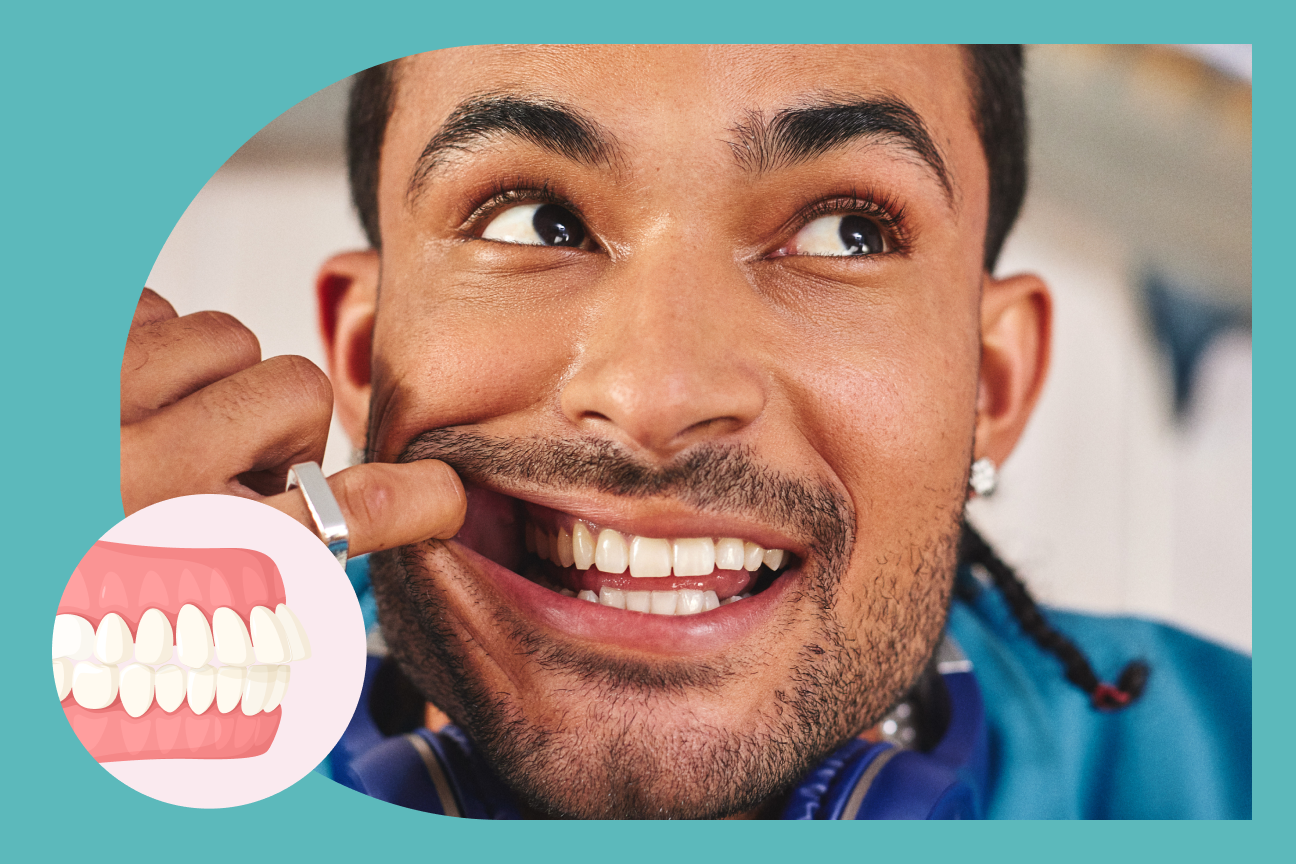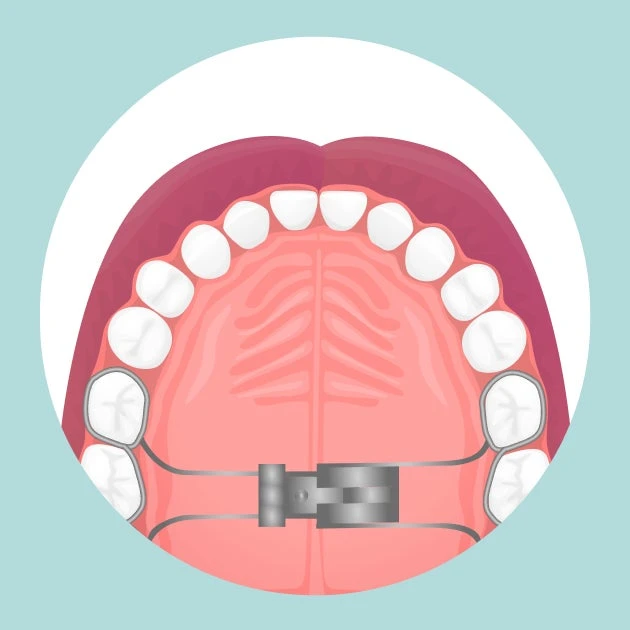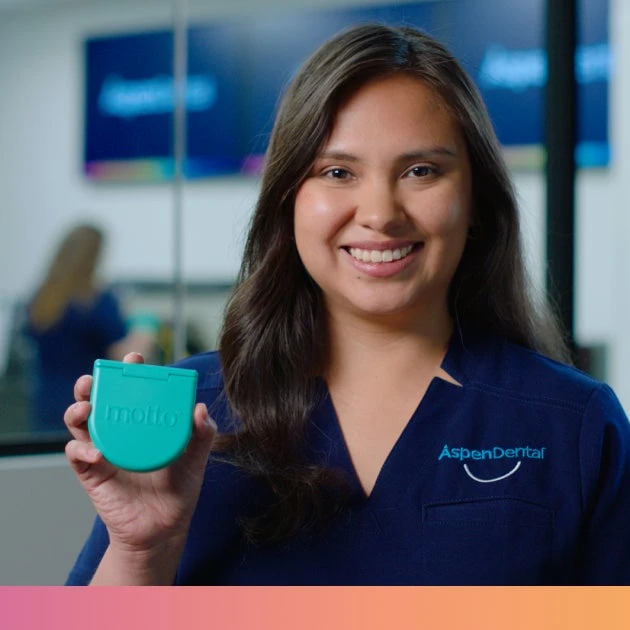Overbite: Causes, effects, and solutions
Explore how overbites affect dental health and the effective treatments available to correct them.
Overbites impact more than just the look of your smile—they can also cause discomfort and affect oral health. The Motto team at Aspen Dental are dedicated to helping you find your best smile.

What is an overbite?
An overbite is a common type of malocclusion (misaligned teeth) where the upper teeth significantly overlap the lower teeth. While slight overbites are normal, significant misalignments may cause jaw pain, speech issues, and uneven tooth wear. The correct treatment can ensure improved oral health and function.
Types of malocclusions
Overbite
An overbite is characterized by the upper teeth significantly overlapping the lower teeth. It rarely causes discomfort, but severe cases can lead to premature wear of the teeth and jaw discomfort.
Overjet (Buckteeth)
Overjet, often confused with overbite, refers to the horizontal protrusion of the upper teeth beyond the lower teeth. Also known as “buckteeth”, this malocclusion is more pronounced than a typical overbite, it can impact both aesthetics and function, possibly requiring corrective dental procedures.
Underbite
An underbite occurs when the lower teeth extend forward beyond the upper teeth. This alignment can complicate biting and chewing and may accelerate wear on your teeth enamel. Treatment options typically include orthodontic interventions to realign the teeth and jaw properly.
Bite by bite: Understanding types of dental alignments
From overbites to crowded teeth and spacing issues, malocclusions present in diverse forms, contributing to individualized dental profiles. These conditions not only affect the alignment of teeth but may also impact overall oral health and function.
Causes of overbite teeth
Overbites can arise from a combination of genetic predispositions and environmental influences, making them a common dental concern. Understanding the root causes can shed light on effective prevention and treatment strategies. The most prevalent reasons for overbite development include:
Inherited jaw structure
Childhood habits
Excessive bone growth
Crowding and misalignment
Injury or trauma
The effects of overbite on teeth
Tooth wear
The constant contact and pressure from the upper teeth can lead to enamel erosion on the lower teeth, making them more susceptible to cavities and sensitivity.
Gum damage
The lower front teeth may rub against the gum tissue behind the upper front teeth, causing gum recession and increasing the risk of periodontal disease.
Aesthetic concerns
Overbites can make the upper teeth appear more prominent, affecting the overall appearance of your smile and facial profile.
Difficulty in chewing and speaking
Severe overbites can affect the way you bite and chew food, potentially leading to digestive issues. Additionally, they can interfere with speech, causing difficulties in pronouncing certain words and sounds.
Effective treatment options for overbite correction

Orthodontic treatment
For mild to moderate overbites, Motto® Clear Aligners, braces, or retainers may be recommended to gradually shift the teeth into proper alignment.

Jaw surgery
In cases of severe overbite where the problem stems from misaligned jaws, orthognathic surgery may be necessary to reposition the upper and lower jaws.

Palate expander
In children with narrow upper jaws contributing to overbite, palatal expanders can be used to widen the palate gradually.

Behavioral modification
In cases where overbite is caused by oral habits like thumb sucking, behavior modification techniques may be employed to break the habit and prevent further complications.
Preventing overbite

Early orthodontic evaluation
Regular dental check-ups starting from childhood allow for early detection of orthodontic issues like overbite, enabling timely intervention.

Encouraging good oral habits
Parents should encourage children to develop good oral habits like proper tongue posture and discouraging thumb sucking or pacifier use beyond infancy.

Limiting bottle and sippy cup use
Minimizing the use of feeding bottles and sippy cups can help prevent overbite by promoting proper tongue and jaw development.

Wearing mouthguards
Athletes participating in contact sports should wear mouthguards to protect their teeth from trauma, which can contribute to overbite.
The role of dentists and orthodontists in treating overbite
Our dentists and orthodontists play a crucial role in diagnosing overbites, a common orthodontic issue that can lead to potential complications if left unaddressed. With a personalized treatment plan developed and guided by our care team at Aspen Dental, you can look forward to improved oral health, enhanced functionality, and a confident smile.
Overbite FAQs
Can you fix an overbite?
Yes, an overbite can be fixed with the right orthodontic treatment. The best approach depends on the severity of the overbite and the specific needs of the patient. It’s best to talk with your Aspen Dental care team to get the best treatment for your smile.
Can adults benefit from overbite treatment?
Yes, correcting an overbite can improve oral function, reduce the risk of tooth wear and damage, alleviate pain, and enhance the overall appearance of your smile.
What are the long term affects of an untreated overbite?
An untreated overbite can lead to several issues, such as excessive tooth wear, chipped teeth due due to uneven pressure, jaw pain, TMJ disorders, and difficulties with chewing and speaking.
Is it OK if I have an overbite?
For the most part, having a mild overbite is common and unharmful. However, if your overbite is more severe, seeking treatment might be necessary.
Can an overbite correct itself?
No, an overbite typically does not correct itself. Addressing an overbite usually requires orthodontic treatment such as braces or clear aligners to adjust the alignment of the teeth and jaw.
Enhance your smile journey
Your bite matters
Properly aligned teeth do more than just enhance your smile; they improve your overall oral health. Correcting an overbite can significantly increase your comfort and prevent future dental issues, which can save you on time, money and pain. Visit Aspen Dental to explore your treatment options and start your journey to a healthier smile.
